Wayne C. Allen's Blog, page 11
October 1, 2023
Fearless Exploration of the Void

Synopsis: Only through fearless exploration of the void can we come to terms with and work with the monsters of our own creation
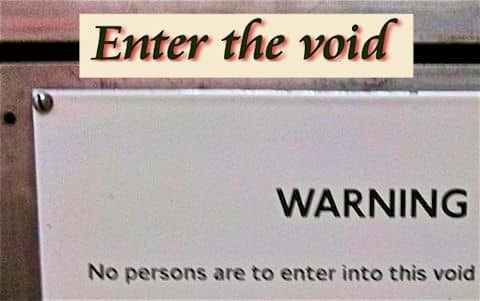

Want to learn more about living a full and meaningful life?
Want to have the best relationship ever?
Check out my books
I received an interesting comment from my friend Karen:
Well, you betcha!I think sometimes people get jazzed by multi tasking or get warm fuzzies from accomplishing lots of “stuff”. Do you think people’s “Busyness” is yet another attempt to fill that endless “hole” without doing the hard work of being alone with the emptiness and/or having conflicts and discussions that need to happen to resolve the hard things? I think busyness may be an addiction like booze or chocolate, or at least a terrific distraction from really thinking about one’s life and doing anything meaningful about changing it.
I think so many people are stuck in this rut that I hope you will write more on this subject.
Let’s look of one side of this–a part that was not mentioned, then get to the issues raised.
Busyness is encouraged by… wait for it… busIness. I suspect that corporate execs worldwide fairly peed themselves when the whole multi-tasking thing arose.
“Oh boy! Double the output from the same workforce! Let’s do seminars!”
I spent a long 10 months back in 1978 working for an insurance company, in the “Human Systems” department. This was “1984″-speak for “efficiency experts.”
They called us “analysts,” and our job was to go in and watch people fill out, say, “Form 101.” We wrote down every action, measured how far the person reached for a pen, for paper, etc., then added it all together, and figured out, from a huge book, how much time, statistically, filling out “Form 101” ought to take.
We looked for ways to shorten the fill-in time, which in many cases amounted to stuff like moving the stack of papers closer.The people being observed were never middle management and up — nobody checked up on them! They were clerical workers, and they hated it when we showed up.
I got let go because I spent a lot of my free time in my departments, getting great results by finding ways to eliminate tasks the workers hated. My boss said, “We’re interested in what’s best for the company, not for the workers. Your priorities are backward.”
I was glad to leave, as the work seemed de-humanizing.I left ahead of the great “multi-taking” push. I’m sure it was adopted whole-heartedly by that company. I’m sure they hired ambidextrous clerks, and tried to get them to fill out two forms at once.
OK, anyway… the take-away here is that multi-tasking is a lie. Try it. You can’t do two things at the same time and give both your full attention. What you can do is get good at flipping rapidly between two tasks, giving the illusion you are doing two things at once. Both things suffer from the shifting.
OK, so that’s my anti-multi-tasking screed. Back to the points raised in the comment.
“I think sometimes people get jazzed by multi tasking or get warm fuzzies from accomplishing lots of “stuff”.”
See above.
Yes, indeed, our culture is built with “stuff” in mind, or has been since Ford’s assembly line clunked into action. Sure, the automation of everything resulted in much lower costs, but ultimately, making “more, better, faster” into a religion has shifted human priorities.
We learned to measure our worth on how fast we move and how big our pile is.And what gets lost in the process? Self-worth, relationship quality, reflection time. Exchanged for “Wow! You sure are a hard worker! Let me add to your pile so everyone knows!”
This shift is real, and it’s from internal to external validation. Titles and degrees become more important than depth and focus.
“Do you think people’s “Busyness” is yet another attempt to fill that endless “hole” without doing the hard work of being alone with the emptiness and/or having conflicts and discussions that need to happen to resolve the hard things?”
For sure.
People in general have never been much interested in the work required to do in-depth personal work. Busy-work (career, hobbies, etc.) has always been the most convenient escape.
Confronting the “void” (the endless “hole”) is (both from a Buddhist and Existentialist POV) the thing most resisted, because it is the most feared.
Let me split this into two. First, let’s look at “the hole.”
 The hot water of self-exploration
The hot water of self-explorationThe hole is what appears when we stop busying ourselves. Meditation “proves” this.
You sit, you bring your attention inward, and almost immediately, the mind starts chattering, throwing up images, stories, aches and pains, all designed to do what we do best–distract ourselves from seeing “the great emptiness.”
But if you “just sit” with the sound and light show, soon you start to notice gaps between stories. As you choose not to be led astray by your stories and imaginings, the gap widens, and you peek through to… nothing. Emptiness. That which lies behind or beyond “form.”
If you keep looking, you see, as the Heart Sutra says, that “Form is emptiness, and emptiness is form.” Emptiness, or “the void,” is the screen upon which “real life” is cast. It’s the other side of the coin of “reality.”
To get to this place, though, requires the courage to just “sit there,” and be with the terror that arises at confronting “non-being.”Nietzsche put it, “Battle not with monsters, lest ye become a monster, and if you gaze into the abyss, the abyss gazes also into you.“
The key word here is “battle.”
Meditation, properly practiced, is not a battle at all, but a “sitting with.” The void, the abyss, emptiness, is who we are; and we are also “fullness.” Our egos, designed to keep us stuck in illusion, wants us to fear the void. To do so, we fill it with monsters of our own making–what will people think, I am a bad person, people are out to get me–stories, fantasies designed to get us to stop looking and to go back to “being busy.”
The joke is, the void, the emptiness is… empty! We populate it with phantoms so that we “don’t go there.” We create it, we forget we created it, and then we scare ourselves with our forgotten creation.
The emptiness, vast and limitless, is as much our real home as is “the worlds” we concoct and call “form.” Or fullness.Back to the quote: “…and/or having conflicts and discussions that need to happen to resolve the hard things?”
Begin here. Are the writer’s “hard things” the same for me, for you? Of course not. You are the source for what you declare to be “hard.”
Relationships end because the people have different stories about what is going on. Not one right, one wrong, but different. So, really, one is saying to the other, “My scary, self-created story is true, yours is false, and because you won’t do things my way, it’s all your fault.”
The writer accurately presents the “cure”–having conflicts and discussions.
Exactly!
For the purposes of this article, make it, “Be scared by the monsters of my own imagination, but keep going by letting go of the fear. Then, share it and work it through anyway.”
Most people choose to simply a void .They have a fight that accomplishes nothing, then run and hide, then come back and apologise –without ever once discussing, let alone resolving, the issue. Wash, rinse, repeat.
The issue, the fear, the terror, never gets discussed or worked through.
Why? Because the 2 people are too busy telling themselves stories, scaring themselves, and thinking ending a relationship is a better alternative than facing and sharing their self-created demons and monsters.
Silly in the extreme.
Often, busyness is the tool that leads to relationship destruction.
“..or at least a terrific distraction from really thinking about one’s life and doing anything meaningful about changing it.”
Yup. Too busy taking the kids to tap dance. Too busy at work. Too busy to sit down, every day, to express fears, angers, emotions. Too busy to sit still and talk issues through to resolution. Too busy for therapy. Too busy to meditate, to breathe, to process.
And then you get to find out what “too busy” bought you, as your self-created monsters bite you in the ass.
The internal monsters you fear are actually your friends. They tell you what to look at, and invite you to sit down and look. And then to do the “easy work” of sharing and working through. (It’s either easy or hard, depending on how you choose to see it.)
 Who’s that staring back at me???
Who’s that staring back at me???The void, the emptiness, is right here, right now, and always is. You can run, but you can’t hide.
So, sit down and have a look, a breath, and another look. If you choose, you will discover that the void looking back at you has a familiar face.
Yours.
Facebook TwitterSeptember 5, 2023
The Courage to be Happy
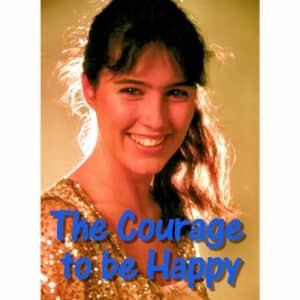
The Courage to be Happy — Happiness: myth and reality

Want to learn more about living a full and meaningful life?
Want to have the best relationship ever?
Check out my books
I just re-watched an episode or several of the HBO TV show, “Tell Me That You Love Me.” The plot revolves around a middle-aged female sex therapist, and how she works with three of her couple clients.
In one episode, the therapist received a box of her freshly published book, called “Bed Dread.” Her husband read the Dedication, the last part of which went, “… and to the men and women who have the courage to be happy.”
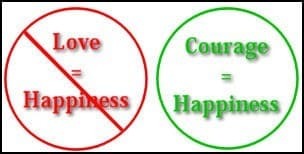
I certainly appreciate the concept.
Why is this so?Given society’s propensity to think that ‘love’ should automatically equal happiness, it’s a brave thing indeed to suggest that the real source of happiness is courage.
Well, there’s a progression of silliness that is common to most relationships. It begins at the ‘falling in love’ stage, when everything seems so perfect. The biological imperative sets in, and the quirks in each others’ behaviour are painted over.
As time goes by, (six months is usually about the standard time) a bit more ‘reality’ sets in. The things not noticed in the romance stage of falling in love begin to emerge. What’s really happening is that a certain level of comfort has been reached, and the parties are more willing to be who they really are.
And the other person iśreceptive to noticing that all is not well on the Titanic.
At this point (as with much of life) there are:
Three choices — two popular ones, and one that’s all about courage.1) Blame yourself - this one is not as popular as the next, but chiefly is this:
“I’m no good. I can’t find a decent partner because I was brought up wrong, am weird, am stupid. I’ll never be happy.”2) Blame your partner - This one is an epidemic — pointing the finger of blame at something “out there.”
Many are the disguises for “other blaming.” Here are a few:
Plain blame: “You make me so unhappy. You’re a terrible person.”Manipulative blame: “If you loved me, you’d do this one thing for me / put me first.“Real message: “Your job is to endlessly serve me. When you fail, I have someone to blame.”Educating Rita: “It’s not your fault. You just don’t know any better. Thank god I am here to teach you all you need to know: how to be a better person, to talk right, to balance your chequebook…“
Real message: “If only you weren’t so stupid and inept, I’d be happy.”The heavy anchor technique: “You are keeping me from my potential.” “You’re disturbing my spiritual path.” “Your constant interference keeps me from meditating.“
Real message: “If only you weren’t so undeveloped and ‘material,’ I’d be a guru by now.”Comparisons: “There’s something wrong with you. Every other person I’ve been with has been delighted with me.“
Real message: “No one has ever stayed around, but maybe if I compare you to what I want, you’ll change and be the first person to stay.”
I could add a bunch more. Many are the variations. However, here’s the key.
Blame is this: making another person responsible for your feelings, intentions, thoughts, and actions.The third choice is courage. The. Best. Relationship. Ever.
The. Best. Relationship. Ever.Note: If your present relationship needs work, well… check out The. Best. Relationship. Ever. It’s my relationships book… you’ll find all the help you need!
It plays out as:
Acceptance: Fully and completely being with the person you are with. (if you can’t, or won’t, you leave.)
accepting personal responsibility for everything about you. Your thoughts, feelings, interpretations, and actions are yours, and yours alone. Major courage required to own this.accepting that your partner is your partner, warts and all (just like you…) Your job is to be there, with a real person, despite your burning desire to turn your partner into someone else.Curiosity: Admitting that you do not and cannot know anything about your partner, and therefore asking instead of analyzing, guessing, or psychoanalyzing.
Most people think they should (if it’s ‘real love’) know what their partner is thinking, feeling, and interpreting. Hint: you can’t. All you can do is listen and ask for clarification. Your job is to learn about yourself, and to reveal yourself — courage is watching and listening as others do the same, without interfering.Last night Darbella and I were coming home from Yoga, and got into a discussion about the emotional pain of unmet expectations, (in this case, not having the Family of Origin you might have wanted.) I was talking theory, and Dar was talking from personal experience, and we kept bumping against each other.As we got home, Dar said, “I was making the point that the pain of disappointment comes up for me occasionally. That’s all I was saying.” I realized we were talking about the same thing from different perspectives.I said, “OK.” There was nothing else to say, no agreement necessary. Just two perspectives, dancing.
Once I got over trying to shift what Dar was talking about, the conversation actually made sense.
Partnership: you’d be surprised how many relationships tank over ‘stuff that stands for other stuff.’
I mean: “You are a slob. Clean the kitchen,” is shorthand for, “I’m not sure I want to be in relationship with you, and especially if you won’t do it my way.”There is no ‘one way’ to do things. There are, however, effective ways. Dar’s never been much interested in household finances, whereas my obsessive nature makes me perfect for them. It would be silly for Dar to do them, even though she ‘could.’Because couples are caught in the trap of blaming, things get divided up oddly. I see a lot of “her money, his money,” and lots of convoluted games for (not) paying bills. A human partnership is also a business. Money is often spent to ‘buy happiness’ because the relationship itself is bankrupt. If you can’t be your partner’s partner, grow up, move on, and get over yourself.Choosing to be happy: Happiness is not a right, nor is it a given. Happiness is not something we work toward.
You are either happy, or you are not.
Many people spend their lives going, “When this, this, and this happens, then I will be happy.” And the ship never gets into that port. Happiness is an internal state of blissful contentment, and it happens (as does everything else) in the here and now .Here and now is not a goal . It is not gained, (nor is contentment, peace, meditative states, anything) in the future , through current actions.In Zen, this is seen as a mind trap. Meditation does not lead to being in the here and now.Stilling the mind lets us see that we are ONLY in the here and now, all the time, whether we are aware of this or not.Choosing happiness, then, is simply noticing, right now, who and where I am. As I do that, I can choose gratitude or I can make myself miserable.Courage: not much of this these days.
Most people are wimps, caught in feeling sorry for themselves, whining, and blaming.
True courage comes from total self responsibility, no excuses.True courage means total acceptance of what is, no whining, no blaming. From total acceptance of “The way it is, is the way it is,” comes the ability, in the next breath, to act to change my relationship with the moment.True courage comes from ‘no complaining.” Check out the website: “A Complaint-Free World”The real goal is not simply to stop complaining, but to state the complaint this way: “Here is what I notice, and here is my interpretation (in this case, “Here’s what I judge to be ‘wrong‘”) AND here is what I propose to change things for the better.”
Complaints, on the other hand, do nothing more than point the finger at ‘outside stuff.’
True courage is looking in the mirror and not blinking: the source of everything is hiding in your mirror. Go have a look. Who you are, where you are, where you are stuck, what the solution is… it’s all there, staring you in the face.
 Go look. Be of good courage.Facebook Twitter
Go look. Be of good courage.Facebook Twitter
July 22, 2023
Examining Your Premise

Examining Your Premise — your beliefs underlie everything you think and do — and most remain unexplored and unexamined. Let’s look at how this happens, and propose a couple of ideas for looking inside

Want to learn more about living a full and meaningful life?
Want to have the best relationship ever?
Check out my books
 We stayed overnight in Toronto, at a hotel. The photo above was taken in the lobby. The joke is subtle; did you get it?
We stayed overnight in Toronto, at a hotel. The photo above was taken in the lobby. The joke is subtle; did you get it?The word premise is wrong. It ought to be premises.
I’m imagining the trailing “s” threw the sign writer. A “premises” is a single location, and a premise is, “a proposition upon which an argument is based or from which a conclusion is drawn.” Thus, a premise is the basis of a belief or understanding.
I wonder how many of us would like to have our beliefs under video scrutinyYou might think of a premise as a core belief – for example, some people
believe that others are dangerous, and some believe in the inherent good nature of others. believe all people of a particular group are a certain way, and some people treat each person as a “blank slate” — and respond according to the individual.We’ve learned to hide the underpinnings of our behaviourSocialization requires blandness. We’ve all learned how to blend in and “not make waves.” We guard what we really think from pretty much everybody.
The work we propose is “learning to flex our surveillance muscles.”This is decidedly different from trying to figure others out. Most of us spend (waste) our lives trying to dissect the motives and desires of others — we engage in endless internal dialogues, playing all the roles, as we peck away at our nearest and dearest. And we never “get” that all of our work is about “me-thinking about others.”
I used to ask clients about their stuff — their world-view, their desires, what path they are “walking,” and I was met with blank stares, or embarrassment. Altogether too scary to explore the quasi-hidden stuff.
Their video surveillance equipment was on pause.Others replied by telling me who they aren’t, or what they don’t want. Or, they, said, others should figure it out for them.
Just a Note! Back in 1994, My first book, Stories From the Sea of Life was published. It’s now out of print, BUT is available as a pdf file. If you’d like to read more of the stories contained therein, go to the home page of The Phoenix Centre Press. Once there, subscribe to the site’s mailing list, and you’ll get the pdf for FREE!
I wrote this little story in that book:A “Passionate Encounter”
The daughter of one of my best friends came in for counselling one day. After assorted pleasantries, Carol said, “Wayne, all of the passion has gone out of our relationship.” (Carol had been dating Will for six months, and living with him for five.) I asked her what she was doing about it. Carol replied, “Every night, I say to Will, ‘Will, all the passion has gone out of our relationship.’ But nothing ever changes.”
I asked Carol if she’d be willing to play a game with me. We would pretend that we were in a relationship. She agreed. I said, “Carol, all of the passion has gone out of our relationship. What are you going to go about it?”
Carol said, “Well, I’ll make you dinner, and then we’ll drink wine in front of a roaring fire and fool around on the couch.” I said, “Carol, that was a fine dinner, the wine is great and you really know how to fool around, but Carol, all of the passion has gone out of our relationship. What are you going to go about it?”
Carol said, “Well, I’ll buy a sexy nightgown and give you a back rub and we’ll take a shower and then make love.” I said, “Carol, that’s one heck of a nice nightgown, and my back feels great, not to say anything about what you did for the rest of me, but Carol, all of the passion has gone out of our relationship. What are you going to go about it?”
Carol said, “Well … damn it, what do you want?”
I said, “Maybe Will is wondering the same thing.”
Carol learned to ask for what she wanted, instead of endlessly listing what she didn’t want. This internal observation is as difficult as we make it.
1. Self-awareness is not self-judgementA client once wrote:
2. Self-awareness is seeing your prejudices
“I figure we can spend our lives apologising for who we are. Apologising for not being beautiful enough, for not conforming, for disappointing our parents, for choosing to not earn a million dollars, for going home early, for not loving hard enough, for not making it better, for just about anything.
Or not.
What if we say this is how it goes down for me? In this 100 years, in this lifetime, I make no apologies for being me. I make mistakes and I’m messy and sometimes I really don’t behave well – because sometimes I just don’t. While I say sorry when I hurt someone else, and try to avoid doing so, there is no apology for being me. Or you.
There is nothing to be gained in apologising for my existence. It’s incredibly rude to want to say sorry for being you. You is what makes the world work, or not. This planet is a billion yous. None of us have any need to apologise for being here right now. We just are here.
This is your story. Yours. How powerful is that?”
A prejudice is a “pre-judgement.” The verdict is in before the evidence is produced. I suspect most prejudices are foisted upon us by tribe, culture, religion, etc. Predictably, we’re quick to notice prejudice in others, and slow to notice it in ourselves.
If I watch myself, I likely will notice a certain tightness, followed by a sense of self-righteousness, when I trigger myself over a prejudice.I’m as as left wing as they come, and I still have a visceral, knee-jerk reaction to right wing conservatives.
I’ve learned to pause… I start by keeping quiet, while I examine what I want to do / say, and then, have another breath. I’ve learned to be critical of a belief, without (necessarily) judging the speaker. After 50 years of practicing this, I seem to deal well with this 90% of the time.
3. Self-awareness is focused on what doSee above. I have not changed my opinion regarding conservatives. What I just wrote about is how I express myself — a doing. My work is all about this: noticing the feeling (in the body) of tightening up, closing down, shutting off. Then, using the body awareness as a “wake up point,” so that rather than operating on auto pilot, I go inside and see what I’m doing to upset myself.
From there, comes the fork in the roadI can still enact whatever knee-jerk retraction I normally toss out, or I can choose to go another way. Darbella describes one of hers as, “In small group I want to pull back and stop talking, so I lean forward and speak.” Our path is not about flawlessness… it’s about choice in the face of our flaws.
4. Self-awareness comes through dialogueWe can and must watch ourselves, and paradoxically, we can’t do this alone. We are so good at pulling the wool over our eyes… finding excuses to repeatedly engage in damaging behaviours, that The Pathless Path requires dialogue.
It’s essential to develop intimacy projects — open, clear, direct dialogue aimed at cutting through the bullshit; getting to the core of the dilemma. In a sense, we do video surveillance on ourselves, and then share the tapes!
Facebook TwitterJuly 8, 2023
Never wait for another to “make you happy”
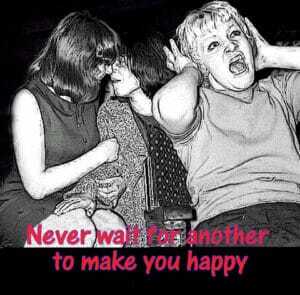
Nothing, including happiness, comes from the outside, so, never wait for another to make you happy

Want to learn more about living a full and meaningful life?
Want to have the best relationship ever?
Check out my books
Getting Past the error of “make you happy”One of the things we really need to recognize is the utter futility of thinking that anything, and especially happiness, comes to us from the outside.
The reason this belief seems so real is that this is the reality of infancy and childhood.
When we are little, everything is given to us. We are hungry, someone feeds us, wet, we are changed, cold, and we are covered. Mom and dad seem to be god-like figures that appear and disappear magically from our limited, almost autistic reality. As we have no experience, no personal history, what we perceive is this: I have a need, and “god” magically appears and fulfills it.
Most moms and dads want us to be content, to be happy. When infants cry, adults rush in to make it all better. Now, remember, the infant has no way of knowing that this is because (s)he is an infant.
In other words, the kid is not thinking, “OK, I’d better enjoy this while I can, because soon I’ll be expected to look after myself.”What is impressed on our child-mind is that rescue comes from outside. Then adulthood comes along, and it is abundantly clear that there is no external rescue. Yet for many, this is completely unacceptable.
Virtually all sex / relationship issues are the result of this fundamental misunderstanding.
It’s like this: the hormones kick in, and you are drawn to a particular person. On one level, there is the whole “procreate” energy. The cues are subtle and below the level of observation, and involve sight, sound and smell. Let us not forget — we are mammals.

We are also thinking mammals. And part of our thought process is a “just under the surface” longing to be loved as we were as infants — to be taken care of. As this thought bubbles up, we come up with all kinds of “reasonable” stories about why this would be eminently fair. No matter how this idea is described, however, it is always a one-way street. Let’s look at how this might be acted out.
Some people are bargainers. They think, “I’ll treat my partner as a king or queen, and then they will treat me the same.”
Others are romantics. They think, “Finally, I have found someone who recognizes how special and precious I am. (S)he will always be at my beck and call, feeding me, changing me, burping me…  ”
”
The root of this kind of immature thinking is, to repeat, our childhood experience of being cared for. None of us would be alive if our parents had not cared for us (no matter how poorly or basically) as infants. Despite being unable to remember any or the details of this time, at our core is a cellular memory of being looked after.
Let’s get real here:
It’s just kind of dumb to expect to be taken care of after we can care for ourselves.
Oh, I know. Hollywood has been feeding you bilge about true love being all about being treated “special.” You do know, don’t you, that movies aren’t real, right?
As we look at the above approaches, we see that the common idea is either entitlement or bargaining. Entitlement is the idea that “I am special, and the world owes me, and must treat me kindly.” Bargaining, “I am going to have to bribe someone to treat me as special, to give me what I deserve.”
Many relationships do start exactly this way: each partner goes out of their way to be kind, giving, helpful, gentle, and caring. And as we all know, the novelty begins to wear off around year three.
That’s because both of the “kids” get tired of the incessant, whiny demands of their partner. Interestingly, this is also the point where, when one whines, “You need to do this for me, if you love me!” that the correct reply becomes, “For god’s sake, grow up!”
Indeed. Growing up requires giving up both bargaining and entitlement.The relationship I have with Darbella is based upon the joy I create for myself as I observe Dar living her life. I have someone to talk to who “gets me,” and who chooses to live with me without judgement or demand. She’s with me because she want to be with me. She is not trying to make me into who she wants me to be. And I see her, and respect and love her for exactly who she is, in this moment.
She cannot make me happy. There is no way for her to get into my head and sort out how I am viewing my reality. Only I can do that. There is no way for her to anticipate what I want, nor can she meet my unexpressed expectations. (I cannot tell you how many times I heard clients say, “We’ve been together for three years! He should know what I want by now!” Yikes!)
Adults ask for what they want, and are willing to take personal responsibility to get what they want. I’ve always said that if I want something badly enough, I can get it. I just might not be able to get it from the first person I ask.
It is not Darbella’s “job” to meet my every need. My mommy did that, until I was 2 or so. I am not married to my mommy. Dar’s only “job” is to show up and be honestly herself. My “job” is to show up and be me. Period.
Happiness is an inside job. It is not a factor of our location, our employment, whether or not we are getting what we want, or who we are in relationship with.
It is always and only about how I choose to view my life and my reality.Happiness comes when I declare myself to be happy.
Every time you notice yourself judging another for “not making you happy,” give yourself a shake. Ask yourself why you are choosing unhappiness, and what you could do, right now, to shift that, for yourself. Take full, personal responsibility for who you are, where you are, and how you are.
You are an adult now. You are totally and completely responsible for your life. If you are in relationship, remember that relationships are places where we learn about ourselves — where we receive feedback and share curiosities about “how life is on our planet.”
Be with your partner because you are interested and “turned on” by their life-walk. And vice versa.
Embrace happiness as a life-choice. It is not something that happens to you. It is how you view what is happening to you. It is an internal sense, rather than an external gift. Lat those around you off the hook, and do what you need to do to be happy.
In other words, it is time to grow up.
 The. Best. Relationship. Ever.
The. Best. Relationship. Ever.Note: If your present relationship needs work, well… check out The. Best. Relationship. Ever. It’s my relationships book… you’ll find all the help you need!
Facebook TwitterMay 4, 2023
Beliefs and Motes
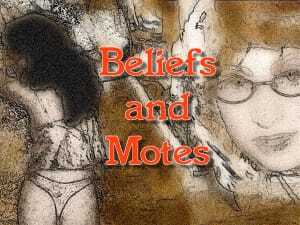
Beliefs and Motes — There is no objective reality. Everything is filtered through our beliefs. Knowing that can make a difference

Want to learn more about living a full and meaningful life?
Want to have the best relationship ever?
Check out my books
 A little bit of dis, a little bit of dat
A little bit of dis, a little bit of dat
Today, I want to mention a quote from Tom Robbins’ Fierce Invalids Home from Hot Climates.
I’ve always loved a good turn of phrase and Robbins’ writing abounds with them. Plus, I love the underlying philosophy.
In the book, Switters is the protagonist, and at one point is talking with a nun. He goes off on a segue about what’s wrong with the world. He declares that all of the world’s problems are the result of what he calls the “killer B’s.”
His “B” list goes on for some length — bombs, beheadings, bloodshed, etc. His point, however, is this — the two banes of existence are Belief and Belonging.Switters is quite aware of the connection between belief and belonging — which in turn is based upon socialization. Socialization is the process of teaching infants and children “the rules” — and those rules are all about fitting in to one’s tribe.
It’s true that belief and belonging lead to behaving .Before I retired, I seldom if ever saw clients who had true mental illnesses. What I did see were people caught in a crisis of meaning — whose beliefs and need to belong had led them far down a path of inauthenticity and false bonding.
As we move further into the 21st century, what is surfacing is abject fear. Some of the fear is based upon the nightly news — The endless regurgitation of Trumpism, climate destruction, etc.
There’s an internal sense of both dread and deadness.“There must be something wrong with me. I’m following all the rules, being a good person… and I’m unhappy and sick and tired and lost. This is not how it’s supposed to be.”
The fear is, “The world is going to end, and I’m going to die unfulfilled.” And the truth of it is, this is so… unless you are willing to let go of the beliefs, the behaviours and the belonging.
No wonder it’s scary.I continue to amaze myself with the cross-generational interference I see.
Parents who continue to manipulate their grown children… trying to get them to behave, to follow the rules, to be the perfect son or daughter. This despite the fact that the grown children have lives of their own… and are emphatically not there to fulfill the parents’ needs. EVER.Or grown children trying to get mom and dad to behave differently, to treat them differently, despite the fact that they’ve been treated this way all their lives. They’re unable to let go of the illusion of belonging to a perfect family — despite knowing nothing is perfect about good old mom and dad.Or spouses desperately trying to manipulate their partner into behaving. Guilting, blaming, cajoling, or playing the “I have your best interests at heart” game.As opposed to letting go.
We really need to loosen our grip on the rules, the regulations, the rigidities we have all been subjected to. All of which begins with an understanding that nothing is “real”… nothing is “true”… for all time and in all places.
Beliefs, behaviours, belonging — social conventions — nothing real, nothing true, about any of it.Most people choose to stay stuck and wallow in self-pity, occasionally seeing a therapist for just enough “support” to maintain their beliefs, without challenging or letting go of any of them.
Rare is the person who, having been stuck for decades, suddenly decides to drop the drama and to become simple. To simply let go. To simply begin living life in the moment. To choose behaviours and beliefs based upon utility rather than on habit, coercion or fear.
This letting go of the “should-be’s” is initially traumatic — then suddenly freeing.Something else crossed my desk — it was a line in an e‑zine I subscribe to. It’s for writers. There was a lovely line that contained a mistype.
The author likes to go on at length about the deeds of her offspring — paragraph after paragraph of “family news” before we get to the writing stuff. I usually skip past it. For some odd reason, my eye got hooked, and I found a gem.
Anyway, she was writing about a trip to the beach with her kids, and about how they were building sand castles. Complete with a moat. Except what she wrote was that the kids had built a “giant mote.”
I about snorted coffee out my nose.I suspect that “mote” is not a common word any more. It’s Old English, and means “speck,” or “a tiny amount of anything.” So, according to her expression, “giant mote,” we get a “huge speck.”
Or, perhaps a giant mote is “making a mountain out of a molehill.”I imagined two kids with tiny shovels, digging minuscule holes in the sand and screaming “look at the size of that one!” (Apparently, even in childhood, size matters…  ) Drama, drama everywhere, and no one notices its “mote-ness.”
) Drama, drama everywhere, and no one notices its “mote-ness.”
We train ’em young, we do. As if anything short of dying is irreversible. As if making things big and important actually has relevance. As if making myself important means I actually am important, as opposed to a caricature of a real human being.
As if “my drama is bigger than yours” is a “good thing.”One of the joys in my life is how good I’m getting at noticing when I’m being dramatic, and making “giant motes.” Ram Dass called losing the drama “Nobody Special Training.” Which flies in the face of our cultural beliefs, behaviours and belonging-ness.
Rather than building giant motes, or even giant moats, perhaps we should simply learn to doff our pretenses, drop the shit we’re shovelling, and have a roll in the sand. Maybe, from a rules and roles perspective, it’s all about nothing. Maybe instead of digging a hole, I can “dig” being whole.
In the end, life is about passion, not behaving. It’s about relating, not belonging. And it’s about who I am and how I choose to interact with the world — not about blindly following the beliefs that mommy and daddy and society taught me.
And it’s about remembering that it’s all a “giant mote.”Facebook TwitterFebruary 20, 2023
Developing Self-Awareness
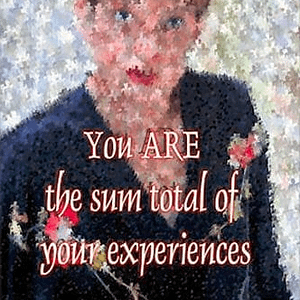
Developing Self-awareness — Self responsibility is never about self absorption. I use the term self-responsibility to describe self awareness. This requires diligent focus on what is going on inside of us, as opposed to endless focus on externals.

Want to learn more about living a full and meaningful life?
Want to have the best relationship ever?
Check out my books
We find ourselves, by finding ourselves.We were brought up to look outside of ourselves – for how to act, what to think, and to discover what’s going on.
For example, many people, when asked about how they are or what is going on for them, immediately begin to tell me what other people are doing. How other people are causing them distress, or confusion. How other people are making them feel something, as if that is possible.

One friend recently mentioned a conversation with a relative she hadn’t seen in years and years. She then speculated on why he had made contact, and then asked me what I thought the relative’s motivation was for making contact. She was totally unaware that our speculations were kind of… well… silly.
She had been there, and participated in the conversation, and yet could only know her thoughts and motivations about her side of the conversation. And I could only know what I thought about what she told me.
I’m unsure about how I could ever know anything about another’s motivation, let alone the motivation of someone I’d never met. But here’s the point.
If she wanted to know what his motivation was, all she had to do was ask him!
This is what I mean by self awareness. A self aware person does not speculate about externals, but rather examines how “I” am in relation to externals.
Self awareness is all about identifying who I am, and how I am, as I live my life fully, deeply, and with passion.
Passion is about enacting or engaging with what is important for me.
Because the word PASSION is typically linked to sensuality and sexuality, we mis-think about our passions. Many think passion is self indulgent, or self absorbed. Others think that passions are sort of like hobbies, to be engaged in as time permits, and always after the real stuff happens. Others distract themselves from their passion by creating drama, or by collecting stuff to mess around with.
I said to a friend the other day that she seemed to be buried under boxes of “collected crap.” Old, unresolved issues and relationships, stuff packed away and dragged out inconveniently, strange things that have no practical use. This stuff, hidden in the metaphoric basement of her mind, (as well as tucked away in her actual basement) was the distraction, the focus, the thing that drew her away from self awareness.
The joke is that she is distracting herself from self awareness be being self absorbed.She is focussed on past issues, and in that, misses the precarious, yet passionate pull of the present.
I like to promote the present as a really great place to live. My focus on presence lets me be fully engaged in seeing myself operating with moment-by-moment awareness.
Self awareness is paying attention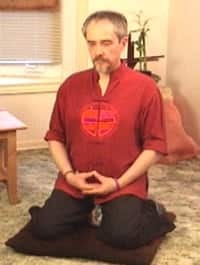
Let me use meditation as a description of what I’m talking about. Many people expect that meditation will lead to something else – peace of mind, calmness, tranquility, or “no problems.”
Yeah, right. Meditation leads to meditation. Meditation is an activity, in and of itself.
Within that activity, much is going on.
Your legs or back might be hurting, you will be thinking thoughts, and you may smell incense, hear outside noises, find the light too bright or dim. In other words, as you sit, you experience.
What you are experiencing, if you let yourself, is the moment-by-moment awareness of being you. You are experiencing yourself, being yourself.
If you begin to think – to have ideas about how the experience ought to be, then you are no longer in the experience. You have drifted off into your head, and are comparing the actual experience with your imagined one, and finding reality lacking!
I would suggest that this is precisely what we are doing, almost all of the time.
Just like my friend in the story above.
She had a real experience with her relative, but then went into her head, there to wonder and imagine what is going on. She created a story about why he was there, talking to her, and thinks that her story is either real or true.
The story, however, has nothing to do with the actual experience. The actual experience was: she was feeling her feelings and thinking her thoughts, and also speaking words to her relative. For her, that was the entire experience.
Until she decided to exit the experience and start telling stories about it.I’m not suggesting that we stop thinking. That’s impossible. What I am suggesting is that, just like in meditation, we dedicate ourselves to noticing what’s actually happening. In this case, thinking. But here’s the key. Noticing that I am thinking, and then shifting to the next thing I do, is different from thinking about what I am thinking about!
If I start thinking, by definition, I am “out of the experience and into my head.”Passion is active and total engagement in the present experience. This flies in the face of the cultural norm of endlessly analyzing everything, (playing with the stuff in the boxes.) The wise soul notices the pull to fiddle around, and then moves on.
No matter what you think you are accomplishing, up there in your head, it pales in comparison to actually doing or producing something.
Passion is engagement with the now. Even such a simple act as “sitting” is ripe with meaning and depth. As you watch, moment by moment, you see yourself, and you see what is up for you. This process is an opening, and what opens is your eyes, your voice, and your heart. You become real.
I mentioned meditation for a reason. I think that this practice, done daily, is what begins to open the door to passionate engagement with life. I’ve heard a million reasons why establishing a daily practice is impossible (I’ve used some of those reasons myself) and what I’ve discovered is that when I do not sit, I do not have very much focus. It’s therefore not one of the things that I make optional.
I encourage you to start meditating.I also encourage you to pay attention to the stories you tell yourself. Presence and passion require that you notice the stories, feelings, evasions, and games that you are playing, all without projecting any of it on to other people or circumstances.
Once you notice that you are not noticing, you can, well, begin to notice.Each and every time you turn your attention to others, and to stories and fantasies, simply name the process, “Externalizing!” and come back to you and your present experience. This is harder than you think. However, it is the key process for finding and engaging your passion.
Do it, now!
December 5, 2022
9 Ways to Screw up a Relationship
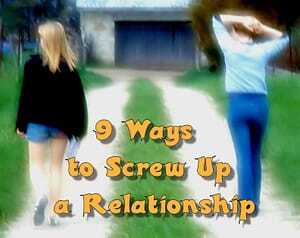
9 Ways to Screw up a Relationship — Thinking that my internal reality is dictated by the behaviours or actions of others is silly.

Want to learn more about living a full and meaningful life?
Want to have the best relationship ever?
Check out my books
1 — Guilting
Guilt trips are one of the most common games played in dysfunctional relationships. The pattern is “If you love me, then you will…” The expectation is that your partner is there to meet your every need, and to ‘make’ you horny, secure, safe, or whatever.
It’s sort of as if people expect their partner to be a 24-hour genie, endlessly dedicated to meeting their every want and need.
Needless to say, this doesn’t work.Initially, during the very early stages of dating, people tend to go out of their way to do this stuff. There’s this panicky tendency to say or do anything to keep the other person around. But, sooner or later, the novelty wears off, and then the expectation changes from “I’ll do anything to keep you.” to, “If you love me, you’ll accept me as I am.”
Now, the joke is, I’ve never met a client who said, “If you love me, you’ll accept me as I am, and because I love you, I’ll accept you as you are.”
Guilting is always in one direction, and it’s based upon the fervently held belief that I am right and you are wrong.
In a sense, all of the Ways to Screw Up a Relationship are based upon this fallacy.
Experiment # 1Replace this screwy behaviour with this: Spend 30 days saying, “I accept you as you are.” As you upset yourself over something you don’t like about your partner, say, “I’m judging you and upsetting myself.” In other words, recognize what you are doing, and thus stop expecting your partner to put your interests first. After all, you don’t put your partner’s first, do you?
2 — Blaming
Blaming is also common. Rather than using ‘sweet persuasion’ (guilting) to change your partner, you rant and rave and finger-point. “My life is miserable because of you! You need to change, and change right now!”
This is simply an escalation of guilting. Manipulation becomes demands and threats.Mostly, what this gets you is the same thing thrown back at you, or a deflective behaviour like ‘the silent treatment,’ spending time away from home with ‘friends,’ or passive — aggressive behaviour, etc.
The main thing to get over in a relationship is thinking that relationships are about changing your partner.
I like to say that your partner is always and only what he or she does. So, if your partner, 90% of the time, is quiet, and 10% of the time yells and stomps around, your partner is both of these behaviours. The 10% is not an aberration—it’s what (s)he does 10% of the time.
You do not get to pick and choose who and how your partner is.
Experiment # 2Replace this screwy behaviour with this: Spend 30 days noticing what your partner does in various situations, without comment. Here is a hint. You are not your partner’s mommy or daddy. You are not there to ‘fix’ your partner. Your only job is to decide whether you want to be with your partner as time goes by. Most healthy marriage partners say, “I haven’t been with her for 25 years. I’ve been with her one day at a time, by choice.”
3 — ComparingRemember essays, and ‘compare and contrast?’ It’s how each of us learned to categorize things. Thus, something is bigger compared to something smaller. It’s also smaller than something larger. We could say, then, that all characteristics are relative.
Where this behaviour becomes a problem is when we compare each other to any form of artificial, external standard. “Other men treated me better than you do.” “Other women thought I’m a good lover.” “No one else yells at me.” “My last boyfriend treated me like a queen.”
This is exactly the same behaviour as the first two—it’s just another tack. Instead of comparing your partner to your imagined partner and finding him lacking, you compare him to a third person, or the infamous “Everyone” (as in ‘Everyone knows…’)
You are likely noticing a pattern here: These behaviours are all designed to change your partner (through various ploys). This particular one is especially weird, as it is all about expecting someone to change to be more like your imaginary friend.
Experiment # 3Replace this screwy behaviour with this: Speak only for yourself, and only in the present. When tempted to compare, try, “I was wondering if you would try this…” In other words, ask for a specific thing. “I would like you to sit and talk with me for 15 minutes,” is more effective than, “All my other boyfriends wanted to talk with me.”
4 — Sex as a Weapon
One client said her relationship wasn’t going well. She wasn’t sure about getting married, as her fiancé liked to walk out when stressed.
I made a comment about asking him directly for what she wanted, and she said something to the effect that she couldn’t; the only way she could “make him behave” was by withholding sex.
I tried to help her understand that sex is not a weapon, a proof of ‘love,’ (as in, and I’ve actually heard this, “I really enjoyed the sex so we must be in love,”) or an indicator of anything other than that physical pleasure feels good.
To use sex as a bribery tool (“Be a good boy and, I’ll have sex with you”) is juvenile and stupid.
Experiment # 4Replace this screwy behaviour with this: There used to be an idea of leaving fights out of the bedroom, and it’s a good one. Sex has absolutely nothing to do with the state of your relationship. Have sex or not, but drop it as a bargaining chip.
And while you’re at it, drop the coy stuff about sex not being important or something you are interested in.
No one believes you anyway.
Many are the people who insist that all they are doing is educating their partner—training them to be decent people who are into the right way of living and being.
“That’s not the way my family does it,” is supposed to ‘wake up’ your partner to the inadequacy of his upbringing, family, and culture, all at once.
I suppose there was some sense to this a century ago, when we lived in the same place and depended upon our families, who lived down the street, or even in the same house. But even then, differentiation of self from parents was a mark of growing up.
Anyone who thinks their mother or father is to be obeyed and followed into adulthood is dreaming in Technicolor.A client once said, “My grandparents sacrificed everything for my parents, and they sacrificed everything for me, and now I’m sacrificing everything for my kids.” I said, “So they can sacrifice everything for their kids?” “No!” he insisted. “I’m doing this for them!”
I said, “Maybe your parents would say the same thing if they were sitting here.”
Your family is your family. No one else cares. Get over it.
Experiment # 5Replace this screwy behaviour with this: Your parents and family did things the way they did things. They got you to adulthood. Good for them! Now, it is your turn to be an adult, form a family and start your own traditions and ways of being. You may love your parents, but they are not arbiters of anything other than their own behaviour.
6 — Dwelling on the past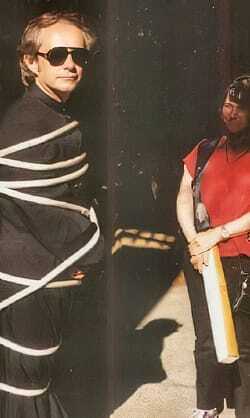
People think that it’s somehow helpful to stack up evidence. The problem is that is never works.
Therapists call this “tossing in the kitchen sink.” It’s the infamous, “…and here are 50 more examples from the past, which I am bringing up to hammer you with what a jerk you are.”
Bringing up the past doesn’t work because your partner has his/her own perspective on past events, and also a list of all of the sins (s)he remembers you committing. All that you end up with is a ‘who is the biggest jerk’ contest.
Back in the day, clients would come in for therapy and expect me to solve their issues by picking who was right and who was wrong. No compentent therapist would ever do that.
I worked toward getting them to stop the blaming and finger pointing, and get to the crux: is this the person I want to spend the rest of my life with?
Experiment # 6Replace this screwy behaviour with this: drag your perception out of the past, and deal with the present situation, in present language. “Here is the situation as I see it (not ‘the right way’) and here is what I propose. How do you see it, and what do you propose?” From there, with discussion, solutions emerge. Just like at work and in ‘real life.’
 The. Best. Relationship. Ever.
The. Best. Relationship. Ever.Note: If your present relationship needs work, well… check out The. Best. Relationship. Ever. It’s my relationships book… you’ll find all the help you need!
7 — AccusingI started counselling in 1981, and never once did Kreskin show up. By this I mean that I have never met a mind-reader.
Accusations might also be described as ‘guessing another’s motive.’ Saying “You’re just doing that to…” has absolutely nothing to do with your partner. All you are really saying is, “Here is how my twisted little mind interprets what I think I heard you say.”
Your judgements about others are not true. They are just stories you tell yourself. To react to someone on the basis of your stories is plainly stupid. The other person doesn’t even need to be there for this to happen (and likely will leave if you keep it up.)
Experiment # 7Replace this screwy behaviour with this: Ask! “I’m wondering what’s up for you” is infinitely better than saying, “I already have you all figured out.” And let me add:o add: Curiosity is not a weapon. “Here are all the ways you’re a total jerk, and I’m curious as to why you act like that.” This is not curiosity. This is judgement and criticism with a veneer of civility.
8 — Doing what you say you don’t want your partner to do
I’ve lost track of how many times I watched some client yell at their partner, and as they yelled, they’d say,
“And I really hate it when you raise your voice when we fight.” Or, “Do you know how many times in the past you have brought up the past? Let me tell you!” Or, “Don’t you dare accuse me of blaming you! You’re the one who always blames me!” Or, “I promise I’ll never try to manipulate you into doing something you don’t want to do, as long as you do this one little thing for me…”In my book The. Best. Relationship. Ever. I suggest setting aside 15–30 minute a day for communication. My instructions are simple.
“Pick a spot, pick a time, show up, and stay there. If your partner shows up, split the time in half. One talks, the other listens. Then, switch.”
No excuses, no, “She didn’t show up, so I stopped too.” Or, “He wasn’t doing it right (read, “He wasn’t saying what I wanted him to.”) so I refused to do it.”
Just “Do what you say you are going to do. If you say you’re going to communicate, communicate. No excuses. It’s not about what your partner does, and never will be.”
Experiment # 8Replace this screwy behaviour with this: Be a person of integrity. Do what you say. If you don’t like yelling, don’t yell. If you want to talk, talk. If you want something, ask for it. If you’re not sure, ask. If you are angry, own your anger as something for inside of you (“I am angering myself right now.”)
9 — Expecting your partner to make you happy
Thinking that my internal reality is dictated by the behaviours or actions of others is silly and plainly untrue.
My partner’s job is to look after herself, to ask for what she wants, and to let me know, with full honesty, how she is, and what she’s doing. She’s not reporting in, and not getting my permission. She’s letting me know because that’s our deal. And I do the same with her.
No one makes you anything, other than you. If you are looking for your partner to cure you, heal you, make you whole, or complete you, you are doomed.
If, on the other hand, you want to establish a relationship based upon honesty, vulnerability and depth, drop all of the above stupid behaviours, and begin anew.
Set your partner free (in your head) from responsibility for what you are doing to yourself, and begin to share who you are, what you want and need, and especially how you are making yourself feel. Share your thoughts and stories and fears, all in self-responsible “I” language.
Invite your partner to do the same.
Your life, right now, is totally and completely the result of what you have thought and what you have done. You have made you, and have made no one else. If you do not like where you are, you must change what you are doing and thinking, while accepting your feelings and judgements, even the faulty ones.
If you will not shift your thinking and acting, you will never be any different than you are in this moment—or, you will ‘get worse.’ No one but you can do anything about this.Start now, and own 100% responsibility for the only person you can ever be responsible about—you. From there, invite your partner to do the same, and to join you on a walk into the depths and heights of self-exploration.
Concluding Note
As a final hint, remember—if something doesn’t work, repeating it endlessly will not suddenly make it work. None of the flawed behaviours above work—and they never have. Be one of the wise ones who gets this, drops them, and moves in another direction.
Facebook TwitterNovember 24, 2022
5 Life Lessons You Need to Get
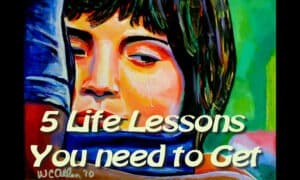
5 Life Lessons You need to Get — some lessons are obvious, but the really important ones are both hidden and hard. Penetration of the veil into the depth of who we are is the only way to “work through” the secret of you.

Want to learn more about living a full and meaningful life?
Want to have the best relationship ever?
Check out my books
It’s amazing how unprepared most folk are, for living, for relating, for finding meaning in a purposeless world.Me too. I remember back in 1968, heading off to Chicago to do my B.A. — and bumping my nose repeatedly over what I thought ought to be happening, vs. what was actually going on. Lesson after lesson, most quite painful. Some of my choices were merely stupid, others dangerous, illegal. In each case, a consequence slapped me across the chops.
The saving grace came from a couple a people. My dad, for one. And a simple line, that is one of my mantras: “That’s too bad. What are you going to do about it?” No rescue, no white knight, no bailouts (financial or otherwise.) Basically, “Whine, then get up and fix it.” Always, always, after a hug.
1. Letting Go“I saw early on that people wanted to connect — indeed, they were connected –but were defended against experiencing the connection. I tried to help them open up, to remove their defenses. Then a natural process of connecting could show. I used to say, “If people let go, they will slide naturally into intimacy.”
Wong and McKeen, Illuminated Heart, p. 27
 Go with the flow
Go with the flowI was re-reading my Masters thesis, and amusing myself at my all-too-earnest prose. Called “The Fear Factor,” it’s clearly a stage in my development (from 1983) and has many aspects that no longer work for me. Much, however, still resonates.
I wanted to identify the factor stopping people from truly knowing themselves, while also adding in a ton of theology and psychology stuff — it was, after all, a thesis. I do find it hard to believe that I thought that way, but it still reads OK. Anyway, I identified fear of others and fear of one’s true self as the cause of alienation from what Theologian Paul Tillich called the Ground of Being.
One major shift since then is I no longer have an opinion about the Ground of Being thing. I let go of it.Here’s something I quoted from Ram Dass.
Letting go of such drama-making has two heads“As you look at many people’s lives you see that their suffering is in a way gratifying, for they are comfortable in it. They make their lives a living hell, but a comfortable one.”
Ram Dass, Journey of Awakening”, p 15
Physically — we need a path to our bodies. It’s why we teach meditation, Qi Gong, and suggest things like yoga and the martial arts. And Bodywork, lots of Bodywork. The first line of defense against finding intimacy is a tight, non-responsive body. Ben Wong uses the word “defended,” Reich the word “armoured.” Both refer to blocking out others by shutting down and tightening up.
Mentally — even those who avoid digging around in their patterns recognize that a lot of “whack stuff” is going on in our heads. We fear ourselves, and we fear others. At some level, we realize that the solution is getting to know ourselves. If we let ourselves fall victim to our own fear(s), we try to run away from ourselves — we clamp a lid on our desire to know, and hide from intimacy with others.
“Loosely” defined: intimacy is letting others in past the defenses, so they “see” more and more of who I am, and what I’m discovering.
Intimacy takes place in dialogue.This work can be described in metaphor — it’s what I call “the dance.” It’s a nice metaphor — sort of like what happens on “Dancing With the Stars.” Over the weeks, the “stars” find their legs and balance and feet, and begin to be co-creators of the dance with the pros. In the process, emotions, thoughts, feelings become more apparent — they’re right out there on the dance floor. Less defended, more open.
The dance starts out teacher to student, and ends up as a partnership, a flow, a sharing.Take away: The tendency is to pull back, to fantasize about life, as opposed to living it —
to wrap the “uncomfortable familiar” around us like a cloak.
Letting go requires activity. Movement. Contact. Presence. Revelation.
And all of this requires a dance partner — someone who will move with you — from beginner to co-creator, to master. You can’t do this work alone, so find someone to work with, and push. Hard.
2. Uniqueness, Commonalities, and Specialness Aren’t I just the most special thing?
Aren’t I just the most special thing?The curse of the 60s and later is the creation a generation of people who think they are “really, really special.” This is expressed in expecting special treatment, undeserved rewards, etc.
From this has come an entitlement that is endemic.
There are masses of folk who think that the world has nothing better to do than to look after their every whim and desire. They are offended when their mistakes are pointed out to them, and expect to be “president of the company” right out of school.
All people have commonalities – for example, our bodies are pretty much the same — food, for almost everyone, goes in one end and comes out the other.Another, more interesting commonality is the presence of the “void.“All of us sense the “non-being” that comes with “being.” What separates us from other animals is that we know that we are “born to die.”
This felt-sense, empty feeling, (a key understanding in Zen…) is shoved down, repressed, ignored — yet it can’t be completely eliminated. We end up with an interior ache, a gnawing knowing that something isn’t quite right — there is something huge looming, and pretending it’s not there results in numbness and anxiety.
“Angst is intrinsic in our being. The more we exist, the more anxiety we feel. The challenges is to embrace and accept this anxiety; this is self-affirmation in the face of non-being.”
Illuminated Heart, p. 155
Specialness is a way to attempt to “avoid” non-being. It’s an insistence that the world (others) pave over the pain of alienation and non-being. The problem with this approach (and entitlement in general) is that it demands an external cure for the internal process of being human.
On the other hand, there is uniqueness, which each of us possess. But not how we usually think of it.Uniqueness is real. My story, my experience, is unique to me. Now, there is a “scary” element to this — my uniqueness means that I am essentially alone in the universe — no one can (or does) see through my eyes. Conflict, all of it — comes from precisely this — the way I see the world is the way I see the world.
Uniqueness is demonstrated in how we act — it occurs only as we let our bodies do what they do. In other words, we are unique in how we express our flexibility to be whomever we choose to be.
Uniqueness is an element of “the void.”Uniqueness is unique. Because of the ubiquity of fear, most decide that the scariness of non-being “snuggled up” against being means it’s best to hide under the bed. To blend in — to fit in — to follow the dictates of “the powers that be.”
“Many persons will not enter the path to being, however, because they instinctively draw back from the experience of nothingness. [the void] Instead of truthful consciousness [being in the face of non-being, uniqueness] they prefer… borrowed pretenses… They give themselves over completely to what their culture accepts as real; that is, they allow the myths of their culture to shape their lives.
Michael Novak, The Experience of Nothingness, p. 80
It’s incredibly difficult to live life with one eye on the past, one on the future, one eye on others’ reactions, and another eye on “the rules.” Oddly, demanding specialness is exactly this path, as is hiding, giving up, and waiting from someone to ride in and rescue you.
Take away: In order to find our uniqueness, we must look unflinchingly inside. We must challenge our belief in external rescue or external definition. If we are stopping ourselves, we need to look at our stories, let go of everything that is not centered in “me,” and then tackle the arduous task of integrating not just what we like about ourselves, but the “whole enchilada.” Like a dance, this is best accomplished face to face, in openness, honesty, and vulnerability.
3. people are as they do“With awareness and responsibility, people are not doomed to be victims of their past or upbringing, or even of the universe. As individuals distill their understanding of their behavioural tendencies and arrive at clear decision about what patterns they want to emphasize, their lives can be different.
Illuminated Heart, p. 397
Yeah, I know. It’s so very, very “contemporary” to proclaim, “I’m a human being, not a human doing!” and then to get your “smug on.” This expression has created generations of quiescent navel gazers. Ashrams, yoga centres, zen centres, are full of them.Neurosis is the way of avoiding nonbeing by avoiding being.
Paul Tillich, “The Courage to Be, ” p. 66
Life is quite real, thank you, and all we have to go on to figure out the game is our reaction or response to what we perceive. It’s like this (and all of) my articles. Nice words, yet words are useless if they do not lead to both a change of heart, and a change in behaviour.
My upbringing, mistakes, stupidities, missteps — all irrelevant, so long as I move past them. Back to the quote, above, uttered repeatedly by my dad: “That’s too bad. What are you going to do about it?” Emphasis on “do.”
You can’t change who you are, (impossible — no way, no how. This does not stop people from trying — they implement “reflection, or prayer, or affirmations” — otherwise known as bullshit internal games.)
You change what you choose to do, right here, right now. In the quote above, Wong and McKeen speak of “patterns they want to emphasize.” What this means is that “everything” is still there — function and dysfunction, weird and wonderful, and all that changes is what is emphasized — what the person brings foreground, what the person moves to background.
Your “doing” is never conditional on externals. Nothing is holding you back, this one time, from acting in variance with what you did last time. And nothing keeps you from repeating what works, and stopping repeating what doesn’t, this one time.
Nothing holds you back, that is, but you.The other thing about doing is this: the only thing that matters is what you do. What you say is immaterial if it’s not backed up with an action that matches. If I say I’m going to communicate self-responsibly, and then there’s an issue and I tear you a new one, I am out of integrity — a liar — no matter how much I whine and protest and try to shift blame.
Take away: you are not being yourself if your doing is not being done. Get off your butt and your buts, pick the next thing, and choose, consciously, to do what you say. Open the door on your fears and triumphs, darkness and light, and act from there. Your choice is to engage fully and uniquely, or hide behind fancy words and excuses.
Your choice!
4. Your Job is to Figure Yourself Out
There is no ultimate “truth” — only individual perspectives to discover. The individual conscience is the final authority, with consequences for every decision and action taken.
Illuminated Heart, p. 39
 Just one more and then I’ll
Just one more and then I’ll write my Sunday School lesson…
For at least the first 18 years of our lives, people were telling us what to do, and making it seem (through persuasion to coercion) that these perspectives were “true,” “good,” and “right.”
We were socialized by those invested in getting us to behave according to the rules of our culture. Because we accepted much of this as “true,” we developed a morality based on tribe, culture, and often, some version of “god.”
Because of the underlying fear of being ostracized, we toe the mark. We want to belong. To do so, we compartmentalize. We stuff stuff into drawers, hide thoughts that deviate from the norm (thus, the “deviant thought or behaviour.”) We become fractured.The “unapproved of” feelings that arise are disconcerting, but mostly we’re encouraged to bury them under a haze of diversions — social, chemical, and commercial. We are taught to distract ourselves, much like mommy distracted us with a favourite toy. This form of stuffing also led us to believe that “mommy” would always be there, toy in hand — that it was the duty of some “other” to rescue us from our tantrums.
If we keep our attention on externals, and blame feelings on others or the situation, we miss the only important data — the lesson that our discontent is internal, and points to our need to explore our beliefs and behaviours.
In one of my books, I wrote about this story: a female client broke off her engagement because her fiance had sex with a female friend. The couple got back together, worked on the relationship. Then, she had sex (on a pool table) with a male friend.
I suggested that the two events were the same. She replied, “No! He had sex because he was horny, and I had sex because I must be in love!” Hmm.
I continued to invite her into her own process — one where opportunity and horniness met to “cue up” some horizontal mambo. Her partner may have provided some visual eye-candy, but it was “all her, all the time.” Her difficulty was that sex was in a compartment labelled “love,” and “good girls” don’t have sex on pool tables, so “obviously” this was love, not sex. She fired me because I didn’t understand.
My brain still hurts from trying to keep up with her twisted blaming.Take away: what we are doing, thinking, saying — that’s the meat of the matter. Rather than cast about for the “groupthink” to explain away your actions, figure out what your “rules” are, wonder if they make sense (hint: most don’t,) and see what you’re parking away in the hidden compartments of your mind and life. Challenge every belief, restriction, and blockage. Turn your attention from the world and the behaviour of others, to a deep self-exploration. It’s the only thing you have a chance of understanding.
5. We Learn By Saying “Yes”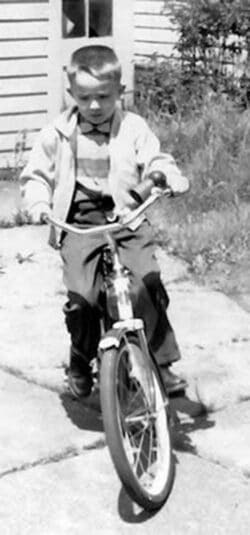 Me, mastering the 2‑wheeler
Me, mastering the 2‑wheelerOdd how we’ve forgotten this one. In our early lives, we learned ONLY because we said “yes.” I’ll use learning to ride a bike as an example, because we’ve all been there.
You learn to ride knowing that you’re going to fall. A Lot. Mom or dad gives you a push, but after that, you’re on your own. Stop pedalling, asphalt. Veer, asphalt. Forget how to brake, asphalt. Stop paying attention, asphalt.
And yet almost everyone who continues to hop on ( to say “yes!”) , learns to ride.
Same with most stuff. We don’t know how to (walk, run, climb stairs, do math, kiss, write papers, bonk, etc.) and somehow, through doing, we learn. And the more we practice, the more we improve.
And yet, we also seem to forget how this works.
To learn to communicate, you have to learn a model, and then practice it continually. To hug comfortably, you have to learn and practice. To explore your inner theatre, you have to learn, and practice.
Noticing a pattern?Take away: much of what I do is to provide experiences that my client has been avoiding. I open doors through comments and Bodywork, and invite the person to walk through and look around. The ones who choose to stay stuck offer a ton of excuses, and not a lot of experiencing.
Yet, the only way to shift ourselves from “non-bike riders” to “bike riders” is to get on, get a push, hold on, and pedal. And then brake appropriately. Again and again. You can always find someone like me who is willing to give the push, but you’ll never find someone to do the pedalling, balancing, and braking. That’s your job.
Sitting on the curb, whining about how hard it is, how scary it is, gets you a sore butt and not much else. Find the things that you scare yourself over, and find a way to tackle them, one by one. Through doing.
Facebook Twitter5 Life Lessons You Need to Get
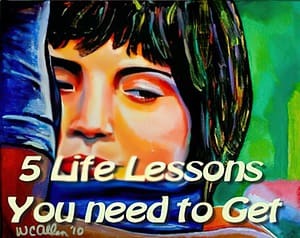
5 Life Lessons You need to Get — some lessons are obvious, but the really important ones are both hidden and hard. Penetration of the veil into the depth of who we are is the only way to “work through” the secret of you.

Want to learn more about living a full and meaningful life?
Want to have the best relationship ever?
Check out my books
It’s amazing how unprepared most folk are, for living, for relating, for finding meaning in a purposeless world.Me too. I remember back in 1968, heading off to Chicago to do my B.A. — and bumping my nose repeatedly over what I thought ought to be happening, vs. what was actually going on. Lesson after lesson, most quite painful. Some of my choices were merely stupid, others dangerous, illegal. In each case, a consequence slapped me across the chops.
The saving grace came from a couple a people. My dad, for one. And a simple line, that is one of my mantras: “That’s too bad. What are you going to do about it?” No rescue, no white knight, no bailouts (financial or otherwise.) Basically, “Whine, then get up and fix it.” Always, always, after a hug.
1. Letting Go“I saw early on that people wanted to connect — indeed, they were connected –but were defended against experiencing the connection. I tried to help them open up, to remove their defenses. Then a natural process of connecting could show. I used to say, “If people let go, they will slide naturally into intimacy.”
Wong and McKeen, Illuminated Heart, p. 27
 Go with the flow
Go with the flowI was re-reading my Masters thesis, and amusing myself at my all-too-earnest prose. Called “The Fear Factor,” it’s clearly a stage in my development (from 1983) and has many aspects that no longer work for me. Much, however, still resonates.
I wanted to identify the factor stopping people from truly knowing themselves, while also adding in a ton of theology and psychology stuff — it was, after all, a thesis. I do find it hard to believe that I thought that way, but it still reads OK. Anyway, I identified fear of others and fear of one’s true self as the cause of alienation from what Theologian Paul Tillich called the Ground of Being.
One major shift since then is I no longer have an opinion about the Ground of Being thing. I let go of it.Here’s something I quoted from Ram Dass.
Letting go of such drama-making has two heads“As you look at many people’s lives you see that their suffering is in a way gratifying, for they are comfortable in it. They make their lives a living hell, but a comfortable one.”
Ram Dass, Journey of Awakening”, p 15
Physically — we need a path to our bodies. It’s why we teach meditation, Qi Gong, and suggest things like yoga and the martial arts. And Bodywork, lots of Bodywork. The first line of defense against finding intimacy is a tight, non-responsive body. Ben Wong uses the word “defended,” Reich the word “armoured.” Both refer to blocking out others by shutting down and tightening up.
Mentally — even those who avoid digging around in their patterns recognize that a lot of “whack stuff” is going on in our heads. We fear ourselves, and we fear others. At some level, we realize that the solution is getting to know ourselves. If we let ourselves fall victim to our own fear(s), we try to run away from ourselves — we clamp a lid on our desire to know, and hide from intimacy with others.
“Loosely” defined: intimacy is letting others in past the defenses, so they “see” more and more of who I am, and what I’m discovering.
Intimacy takes place in dialogue.This work can be described in metaphor — it’s what I call “the dance.” It’s a nice metaphor — sort of like what happens on “Dancing With the Stars.” Over the weeks, the “stars” find their legs and balance and feet, and begin to be co-creators of the dance with the pros. In the process, emotions, thoughts, feelings become more apparent — they’re right out there on the dance floor. Less defended, more open.
The dance starts out teacher to student, and ends up as a partnership, a flow, a sharing.Take away: The tendency is to pull back, to fantasize about life, as opposed to living it —
to wrap the “uncomfortable familiar” around us like a cloak.
Letting go requires activity. Movement. Contact. Presence. Revelation.
And all of this requires a dance partner — someone who will move with you — from beginner to co-creator, to master. You can’t do this work alone, so find someone to work with, and push. Hard.
2. Uniqueness, Commonalities, and Specialness Aren’t I just the most special thing?
Aren’t I just the most special thing?The curse of the 60s and later is the creation a generation of people who think they are “really, really special.” This is expressed in expecting special treatment, undeserved rewards, etc.
From this has come an entitlement that is endemic.
There are masses of folk who think that the world has nothing better to do than to look after their every whim and desire. They are offended when their mistakes are pointed out to them, and expect to be “president of the company” right out of school.
All people have commonalities – for example, our bodies are pretty much the same — food, for almost everyone, goes in one end and comes out the other.Another, more interesting commonality is the presence of the “void.“All of us sense the “non-being” that comes with “being.” What separates us from other animals is that we know that we are “born to die.”
This felt-sense, empty feeling, (a key understanding in Zen…) is shoved down, repressed, ignored — yet it can’t be completely eliminated. We end up with an interior ache, a gnawing knowing that something isn’t quite right — there is something huge looming, and pretending it’s not there results in numbness and anxiety.
“Angst is intrinsic in our being. The more we exist, the more anxiety we feel. The challenges is to embrace and accept this anxiety; this is self-affirmation in the face of non-being.”
Illuminated Heart, p. 155
Specialness is a way to attempt to “avoid” non-being. It’s an insistence that the world (others) pave over the pain of alienation and non-being. The problem with this approach (and entitlement in general) is that it demands an external cure for the internal process of being human.
On the other hand, there is uniqueness, which each of us possess. But not how we usually think of it.Uniqueness is real. My story, my experience, is unique to me. Now, there is a “scary” element to this — my uniqueness means that I am essentially alone in the universe — no one can (or does) see through my eyes. Conflict, all of it — comes from precisely this — the way I see the world is the way I see the world.
Uniqueness is demonstrated in how we act — it occurs only as we let our bodies do what they do. In other words, we are unique in how we express our flexibility to be whomever we choose to be.
Uniqueness is an element of “the void.”Uniqueness is unique. Because of the ubiquity of fear, most decide that the scariness of non-being “snuggled up” against being means it’s best to hide under the bed. To blend in — to fit in — to follow the dictates of “the powers that be.”
“Many persons will not enter the path to being, however, because they instinctively draw back from the experience of nothingness. [the void] Instead of truthful consciousness [being in the face of non-being, uniqueness] they prefer… borrowed pretenses… They give themselves over completely to what their culture accepts as real; that is, they allow the myths of their culture to shape their lives.
Michael Novak, The Experience of Nothingness, p. 80
It’s incredibly difficult to live life with one eye on the past, one on the future, one eye on others’ reactions, and another eye on “the rules.” Oddly, demanding specialness is exactly this path, as is hiding, giving up, and waiting from someone to ride in and rescue you.
Take away: In order to find our uniqueness, we must look unflinchingly inside. We must challenge our belief in external rescue or external definition. If we are stopping ourselves, we need to look at our stories, let go of everything that is not centered in “me,” and then tackle the arduous task of integrating not just what we like about ourselves, but the “whole enchilada.” Like a dance, this is best accomplished face to face, in openness, honesty, and vulnerability.
3. people are as they do“With awareness and responsibility, people are not doomed to be victims of their past or upbringing, or even of the universe. As individuals distill their understanding of their behavioural tendencies and arrive at clear decision about what patterns they want to emphasize, their lives can be different.
Illuminated Heart, p. 397
Yeah, I know. It’s so very, very “contemporary” to proclaim, “I’m a human being, not a human doing!” and then to get your “smug on.” This expression has created generations of quiescent navel gazers. Ashrams, yoga centres, zen centres, are full of them.Neurosis is the way of avoiding nonbeing by avoiding being.
Paul Tillich, “The Courage to Be, ” p. 66
Life is quite real, thank you, and all we have to go on to figure out the game is our reaction or response to what we perceive. It’s like this (and all of) my articles. Nice words, yet words are useless if they do not lead to both a change of heart, and a change in behaviour.
My upbringing, mistakes, stupidities, missteps — all irrelevant, so long as I move past them. Back to the quote, above, uttered repeatedly by my dad: “That’s too bad. What are you going to do about it?” Emphasis on “do.”
You can’t change who you are, (impossible — no way, no how. This does not stop people from trying — they implement “reflection, or prayer, or affirmations” — otherwise known as bullshit internal games.)
You change what you choose to do, right here, right now. In the quote above, Wong and McKeen speak of “patterns they want to emphasize.” What this means is that “everything” is still there — function and dysfunction, weird and wonderful, and all that changes is what is emphasized — what the person brings foreground, what the person moves to background.
Your “doing” is never conditional on externals. Nothing is holding you back, this one time, from acting in variance with what you did last time. And nothing keeps you from repeating what works, and stopping repeating what doesn’t, this one time.
Nothing holds you back, that is, but you.The other thing about doing is this: the only thing that matters is what you do. What you say is immaterial if it’s not backed up with an action that matches. If I say I’m going to communicate self-responsibly, and then there’s an issue and I tear you a new one, I am out of integrity — a liar — no matter how much I whine and protest and try to shift blame.
Take away: you are not being yourself if your doing is not being done. Get off your butt and your buts, pick the next thing, and choose, consciously, to do what you say. Open the door on your fears and triumphs, darkness and light, and act from there. Your choice is to engage fully and uniquely, or hide behind fancy words and excuses.
Your choice!
4. Your Job is to Figure Yourself Out
There is no ultimate “truth” — only individual perspectives to discover. The individual conscience is the final authority, with consequences for every decision and action taken.
Illuminated Heart, p. 39
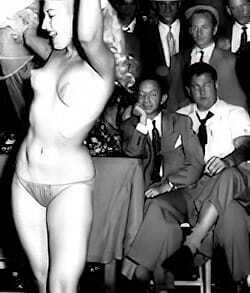 Just one more and then I’ll
Just one more and then I’ll write my Sunday School lesson…
For at least the first 18 years of our lives, people were telling us what to do, and making it seem (through persuasion to coercion) that these perspectives were “true,” “good,” and “right.”
We were socialized by those invested in getting us to behave according to the rules of our culture. Because we accepted much of this as “true,” we developed a morality based on tribe, culture, and often, some version of “god.”
Because of the underlying fear of being ostracized, we toe the mark. We want to belong. To do so, we compartmentalize. We stuff stuff into drawers, hide thoughts that deviate from the norm (thus, the “deviant thought or behaviour.”) We become fractured.The “unapproved of” feelings that arise are disconcerting, but mostly we’re encouraged to bury them under a haze of diversions — social, chemical, and commercial. We are taught to distract ourselves, much like mommy distracted us with a favourite toy. This form of stuffing also led us to believe that “mommy” would always be there, toy in hand — that it was the duty of some “other” to rescue us from our tantrums.
If we keep our attention on externals, and blame feelings on others or the situation, we miss the only important data — the lesson that our discontent is internal, and points to our need to explore our beliefs and behaviours.
In one of my books, I wrote about this story: a female client broke off her engagement because her fiance had sex with a female friend. The couple got back together, worked on the relationship. Then, she had sex (on a pool table) with a male friend.
I suggested that the two events were the same. She replied, “No! He had sex because he was horny, and I had sex because I must be in love!” Hmm.
I continued to invite her into her own process — one where opportunity and horniness met to “cue up” some horizontal mambo. Her partner may have provided some visual eye-candy, but it was “all her, all the time.” Her difficulty was that sex was in a compartment labelled “love,” and “good girls” don’t have sex on pool tables, so “obviously” this was love, not sex. She fired me because I didn’t understand.
My brain still hurts from trying to keep up with her twisted blaming.Take away: what we are doing, thinking, saying — that’s the meat of the matter. Rather than cast about for the “groupthink” to explain away your actions, figure out what your “rules” are, wonder if they make sense (hint: most don’t,) and see what you’re parking away in the hidden compartments of your mind and life. Challenge every belief, restriction, and blockage. Turn your attention from the world and the behaviour of others, to a deep self-exploration. It’s the only thing you have a chance of understanding.
5. We Learn By Saying “Yes”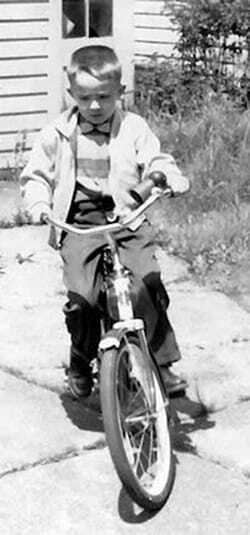 Me, mastering the 2‑wheeler
Me, mastering the 2‑wheelerOdd how we’ve forgotten this one. In our early lives, we learned ONLY because we said “yes.” I’ll use learning to ride a bike as an example, because we’ve all been there.
You learn to ride knowing that you’re going to fall. A Lot. Mom or dad gives you a push, but after that, you’re on your own. Stop pedalling, asphalt. Veer, asphalt. Forget how to brake, asphalt. Stop paying attention, asphalt.
And yet almost everyone who continues to hop on ( to say “yes!”) , learns to ride.
Same with most stuff. We don’t know how to (walk, run, climb stairs, do math, kiss, write papers, bonk, etc.) and somehow, through doing, we learn. And the more we practice, the more we improve.
And yet, we also seem to forget how this works.
To learn to communicate, you have to learn a model, and then practice it continually. To hug comfortably, you have to learn and practice. To explore your inner theatre, you have to learn, and practice.
Noticing a pattern?Take away: much of what I do is to provide experiences that my client has been avoiding. I open doors through comments and Bodywork, and invite the person to walk through and look around. The ones who choose to stay stuck offer a ton of excuses, and not a lot of experiencing.
Yet, the only way to shift ourselves from “non-bike riders” to “bike riders” is to get on, get a push, hold on, and pedal. And then brake appropriately. Again and again. You can always find someone like me who is willing to give the push, but you’ll never find someone to do the pedalling, balancing, and braking. That’s your job.
Sitting on the curb, whining about how hard it is, how scary it is, gets you a sore butt and not much else. Find the things that you scare yourself over, and find a way to tackle them, one by one. Through doing.
Facebook TwitterOctober 19, 2022
Body Gates and the Path to Self-Knowing
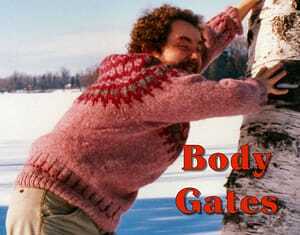
Body Gates — there are gates in the body — metaphoric passages from one stage of development to another. We look at moving into the “full expression of self” — into full being.

Want to learn more about living a full and meaningful life?
Want to have the best relationship ever?
Check out my books
Many moons ago, a client of mine e‑mailed a story of an interaction. She and her partner had a conversation (sort of) about the state of the relationship. What became clear was that they were coming at the relationship from two different perspectives. She also mentioned some pain in her collar-bone area, and I remembered that her upper back had been quite sore during her previous Bodywork session.
I wrote back, and half way through, realized that what I was writing would be a beneficial article about Bodywork and relationships. What follows is my take on the issue my client raised, with notes.
I replied with two things:
What follows is a metaphor that demonstrates the path to full and vibrant living.
According to Eastern thought, there are at least two “diaphragms” or “gates between” in the body. The first is between the solar plexus and the heart, and the second is in the vicinity of the throat.
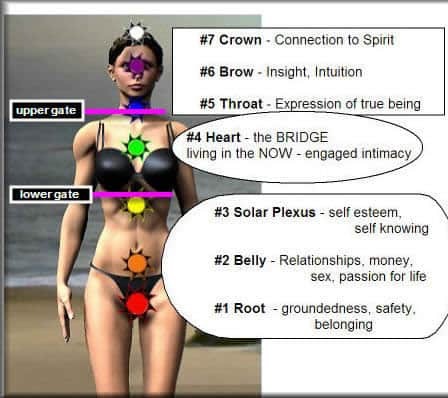 Let’s talk chakras, but these zones also exist in Chinese medicine.
Let’s talk chakras, but these zones also exist in Chinese medicine.
Here’s the pattern in simplified form.
In the coding below the | represents the gates.
It’s 1,2,3 | 4 | 5,6,7
The 3 represent:
Root — security, stability, existenceBelly — relationships; he we relate to everything and everyone.Solar Plexus — self-esteemThe “zone” made up of chakras 1, 2, and 3 is the zone of stability, relationships, and self-esteem.
My client discovered that her partner’s self-esteem is connected to job, money, “cleanliness,” tidiness, order, control, etc. For him, any form of “clutter” became a self-esteem issue.
He thought: “If I see a mess, I feel bad about myself, and assume it is either an insult (I blame others for my messes) or I blame myself for not trying hard enough.“
With effort you can move past zone 1,2.3

However, because of the strength of the first diaphragm or gate, most people do not move out of this very physical realm.
They have a vague sense of “something more,” but no clue how to get there, so they keep messing around in familiar waters. They change jobs, partners, obsess, clean, move their piles from one place to another, try to be happy by making more money etc, and this tension and drive to shift piles seems normal–as in, “What I’m stuck with.”
You get yourself unstuck by identifying the 1,2,3 zone, owning it, and then coming to a new understanding, which might be thought of as the “spiritual” / vocational aspect of living. This begins at the heart.
Zone 4–The heart chakra is the intermediary between physical (1,2,3) and the spiritual (5,6,7)Openheartedness is the first step on a long walk into vocational, present, “in the moment” living. This requires simple acceptance — of others, of self, of the Taoist principle. “The way it is, is the way it is.“
The Heart Chakra is the locale of “being,” (as opposed to “doing,” which is the realm of Zone 1,2,3) and is sensed as “emptiness” (as in, “empty of meaning”)
This is not nihilism, but rather symbolized by the emptiness that comes in between thoughts when meditating, for example.
The next diaphragm, at the shoulders, is interesting.

You could, I suppose, “live” at the heart level, and simply be a sort of passive acceptor of “whatever.” This, to me, seem disingenuous, and somewhat self absorbed.
The transition, the process of moving through the upper gate or diaphragm, leads to the expression of (the actual living of) an egoless spiritual life.
This transition requires the use of 5,6,7The throat — which stands for the release of true self into the world, metaphorically through speech, is actually about expressing the totality of one’s being.The Third Eye — Insight — intuition, and the ability to see what’s really going on.Transcendence — satori, enlightenment, etc.If there is a block at the shoulder diaphragm, getting past it requires actualizing the first 4. The work is to assimilate the 1,2,3, (physical zone,) with the heart (4), so that all physical being and acting is done out of compassion.
My client wrote a list of her priorities for life:As Lama Marut put it:
“Compassion for others is impossible until you care enough for yourself to really want to stop your own suffering.”
Her list was, in the order she chose: love (chakra 4), taking care of self (chakra 3), taking care of others ( chakra 2) — Footnote: our real work is self work, so the language of her last priority is not correct. We can care about others, but can never take care of others. That is their job.
Notice the direction of my client’s list — hint — it’s downward, toward the root chakra, which means it’s focused on stability and security, as opposed to moving past whatever issue arises by transcending it.
My list might be: being loving (an action), being direct and clear, being myself, and deepening my connection to that which is. Notice that there is only “me” in this — yet if I do “me” well, those around me benefit. The direction is upward and inclusive.
Back to my client’s partner. He was fighting off self-created Chaos by trying to establish rules and structures.
He cleans when he comes home, not to punish my client or to ignore her, but to try to keep his collapsing, chaotic world together. If the house was spotless, he would create another issue to obsess about.My client’s partner was stuck trying to make his little feetsies run fast enough to keep all the balls in the air. He had to to crash and burn before he realized the futility of this path.My client’s job was to keep him talking, while asking, repeatedly, “How’s that working for you?“He stayed stuck until he saw the impossibility of structuring himself into happiness.
Question everything, and get rid of what does not work.This was the stage my client was at when she emailed, and it was expressed through pain at the upper or second diaphragm or gate–at her shoulder blades, upper shoulder muscles, and her collar-bone.
My client had rules about who she was and how she was, and she often got stuck defending them, intellectually and physically. Ultimately, she learned to laugh at her rules, rather than fiddling with them — she learned to have her experience(s) as opposed to trying to force them to fit her no longer useful rules.



